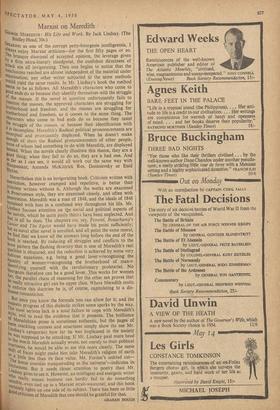Marxist on Meredith
GEORGE MEREDITH: His Life and Work. By Jack Lindsay. (The Bodley Head, 30s.) SPEAKING as one of the corrupt petty-bourgeois intelligentsia, I always enjoy Marxist criticism—for the first fifty pages or so. Line brusque dismissal of accepted opinion, the leverage given °Y a firm extra-literary standpoint, the confident directness of attack are all invigorating. Then one begins to notice that the conclusions reached are almost independent of the material under examination; any other writer subjected to the same methods Would yield the same results. In Mr. Lindsay's book the method seems to be as follows. All Meredith's characters who come to Good ends do so because they identify themselves with the struggle °I the masses. If the novel in question unfortunately fails to mention the masses, the approved characters are struggling for brotherhood and freedom, and the masses are struggling for brotherhood and freedom, so it comes to the same thing. The .eilliaracters who come to bad ends do so because they resist e struggle of the masses, or because their identification with 't Is incomplete. Meredith's Radical political pronouncements are excerpted and prominently displayed. When he doesn't make some of them the Radical pronouncements of other people, ih°111e of whom had something to do with Meredith, arc displayed :stead. When the novels clearly illustrate this theme, they are a '°e'd thing; when they fail to do so, they are a bad one. And as far as I can see, it would all work out the same way with h bl,anPassant, Amanda McKittrick Ros, Dostoievsky or Enid ulYton, Nevertheless this is an invigorating book. Criticism written with e _°tIvietion, however cramped and repetitive, is better than uriticistn written without it. Although the works are examined 14 Procrustean style, they are examined closely, and often with tknetration. Meredith was a man of 1848, and the ideals of 1848 ietitained with him in a confused way throughout his life. Mr.
the focuses attention on the social and political aspects of that novels, which he quite justly thinks have been neglected. And ,,at is all he does. The chapters on, say, Feverel, Beauchamp's career and The Egoist would have made his point sufficiently; we as novel after novel is unrolled, and all point the same moral, '13Ye find that we know all the answers long before the end of the 100k is reached. By reducing all struggles and conflicts to the same Pattern the flashing diversity that is one of Meredith's real qualities is obscured; and the reduction is achieved by some very celubi?us equations, e.g. being a good lover=recognising the iranlY of women=recognising the brotherhood of man= bourgeois yourself with the revolutionary proletariat. No t°11rgeois therefore can be a good, lover. This works for women tle'n; the parallel chain of reasoning for the other sex proves that really attractive girl can be upper class. Where Meredith omits 1," enforce this doctrine he is, of course, capitulating to a dis- "onest romanticism. 41,13ut Once you know the formula you can allow for it; and the l'Istie progress of this dialectic strikes some sparks by the way. The most serious lack is a total failure to cope with Meredith's style and to read the evidence that it presents. The brilliance ,„ '"Lieredithian prose is sometimes authentic, but the pages of 4:ere Crackling coyness and smartness simply show (to use Mr. hellusay's categories) how far he was implicated in the society to was supposed to be attacking. If Mr. Lindsay paid more heed over words Meredith actually wrote, not merely to their political shrones, he would be able to see this more clearly. The same at't Of focus might make him take Meredith's religion of earth little lless than its face value. Mr. Forster's unkind cut— The masquerading as the universe'—indicates its .nitatio„... But it needs closer attention to poetry than Mr. W1-111 dsay gives to see it..However, an intelligent and energetic writer senos.,r,eallY means business can hardly fail to do something certainly I", le, even tied up in a Marxist strait-waistcoat; and this book good lights up one side of its subject. There has been so little a. criticism of Meredith that one should be grateful for that.
GRAHAM HOUGH










































 Previous page
Previous page